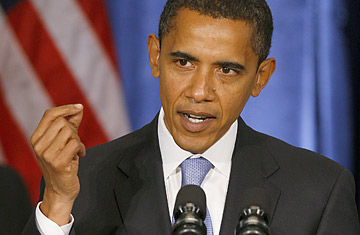
President-elect Obama answers questions during a news conference in Chicago
Hard as his opponents tried to rattle Barack Obama during the presidential campaign, even their most blustery attacks usually left him cool, considered and respectful. Now Obama is trying out the same calm treatment on the U.S.'s adversaries abroad, offering a first glimpse of how the young President may carry himself on the international stage. But even if Obama's temperament can warm the diplomatic atmosphere, will it help resolve the U.S.'s toughest issues abroad?
The question has been put to an early test: The day after Obama's election, Russian President Dmitri Medvedev publicly threatened to deploy missiles near the borders of two NATO allies to counter the Bush Administration's plans to install antimissile systems in Poland and the Czech Republic. The Russian announcement, rolled out during an elaborate ceremony, was timed to put one of the most contentious issues between Moscow and Washington on Obama's table right away. Obama and his advisers took it as an intentional provocation aimed at testing the President-elect.
Despite the bashing they had received in the campaign from John McCain for being soft on Russia, Obama and his advisers decided not to push back against Medvedev. They issued no statement on the record or on background about the Medvedev announcement. Instead, Obama politely returned Medvedev's congratulatory Nov. 8 phone call and laid out for his Russian counterpart his own view of the U.S.-Russia agenda. Aides say Obama and Medvedev discussed substantive issues in the call, but missile defense didn't come up. The Russian President responded positively to Obama's understated reaction. "The Russians were very congratulatory, so it was a good and productive call," says an Obama aide. (See pictures of the world reacting to Obama's win.)
So was the calm response to Russia's missile gambit a success? Obama's aides present it as a sober counterpoint to McCain's tough talk during the campaign. "What was overlooked in [Medvedev's] speech was a part about working cooperatively on issues of common concern," says the aide. "So the transition [team] seized upon that issue up front." Such tactics, however, have not pleased some on the hawkish right who fear that Obama is appeasing the Russians. Daniel Henninger of the Wall Street Journal editorial board called on Obama to say "publicly and explicitly [that he] will not be intimidated by actions like this."
In fact, Obama's biggest challenge lies not in the tone he takes with the Russians but in the substantive policy choices he makes. While Medvedev may in part have been testing whether he can fluster Obama, he's more interested in probing the Democrat's ambiguous position on missile defense. And in that regard, Obama faced another test near the time of the Medvedev phone call.
Obama returned the congratulatory call of Polish President Lech Kaczynski and discussed the U.S.-Polish alliance. After the call, Kaczynski released a statement claiming that Obama had promised "that the [U.S.] missile-defense project would continue."
That presented the Obama team with a second dilemma. Poland is an important ally, with more than 1,000 troops in Afghanistan. On the other hand, Kaczynski broke protocol by releasing details of the private call. What's more, aides say, he mischaracterized what Obama had said.
Denis McDonough, a top Obama aide, released a statement saying that during the call the President-elect had not endorsed the antimissile deployment but had simply repeated his strategically ambiguous position from the campaign. "[Obama] supports deploying a missile-defense system when the technology is proved to be workable," McDonough said. In an apparent attempt to soften Poland's embarrassment at being publicly contradicted, Obama had Vice President–elect Joe Biden quietly follow up with a call to Kaczynski on Monday, aides say.
The Russians, however, now think they may be able to back Obama away from the Bush Administration's commitment to deploy the missile-defense systems to Poland and the Czech Republic. On Wednesday, the three main Russian news agencies quoted an unnamed Kremlin source as rejecting the latest efforts by the Bush Administration to assuage Moscow's fears and suspending talks with Washington on the issue. "We will not give our agreement to these proposals," the source is quoted as saying, "and we will speak to the new Administration."
So did Obama's nonconfrontational response impede progress on resolving the dispute with Moscow over missile defense? Probably not. Given the Democrat's ambiguous position on the issue, Russia is unlikely to accept any U.S. deal offered in the interregnum after his election. Yet Obama's "no drama" reaction at least avoided confrontation and bought him some time to pull together a foreign policy team and decide where he really stands on the deployment of missile defense to Europe. As former Deputy Secretary of State Richard Armitage used to say, "Diplomacy is the art of saying 'Nice doggy' while looking for a stick."
